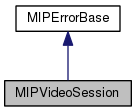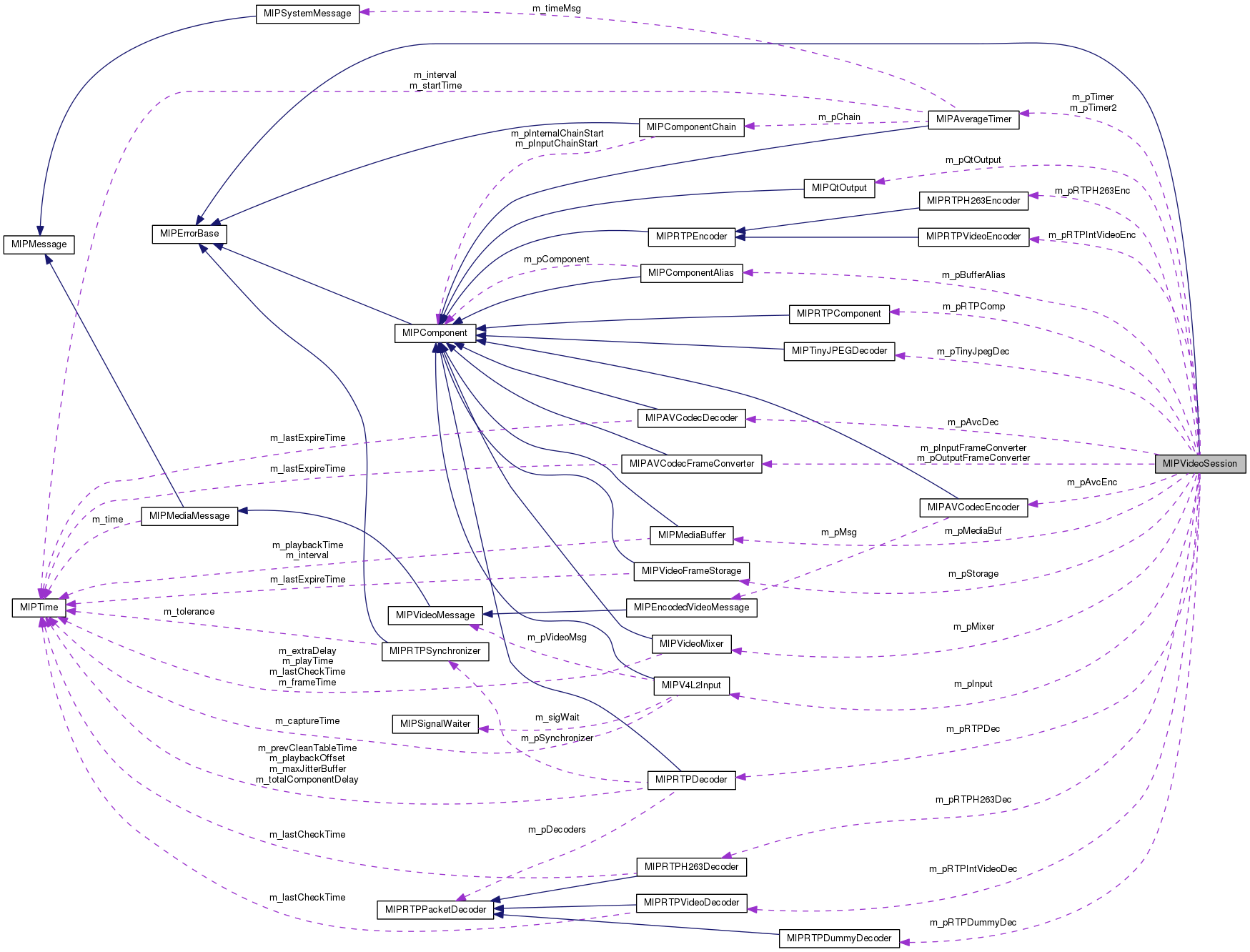Creates a video over IP session.
More...
#include <mipvideosession.h>
List of all members.
Public Member Functions |
| bool | init (const MIPVideoSessionParams *pParams=0, MIPRTPSynchronizer *pSync=0, jrtplib::RTPSession *pRTPSession=0) |
| | Initializes the session.
|
| bool | destroy () |
| | Destroys the session.
|
| bool | addDestination (const jrtplib::RTPAddress &addr) |
| | Add a destination.
|
| bool | deleteDestination (const jrtplib::RTPAddress &addr) |
| | Delete a destination.
|
| bool | clearDestinations () |
| | Clear the destination list.
|
| bool | supportsMulticasting () |
| | Returns true if multicasting is supported, false otherwise.
|
| bool | joinMulticastGroup (const jrtplib::RTPAddress &addr) |
| | Joins a multicast group.
|
| bool | leaveMulticastGroup (const jrtplib::RTPAddress &addr) |
| | Leaves a multicast group.
|
| bool | leaveAllMulticastGroups () |
| | Leaves all multicast groups.
|
| bool | setReceiveMode (jrtplib::RTPTransmitter::ReceiveMode m) |
| | Set a receive mode.
|
| bool | addToIgnoreList (const jrtplib::RTPAddress &addr) |
| | Adds an address to the ignore list.
|
| bool | deleteFromIgnoreList (const jrtplib::RTPAddress &addr) |
| | Removes an address from the ignore list.
|
| bool | clearIgnoreList () |
| | Clears the ignore list.
|
| bool | addToAcceptList (const jrtplib::RTPAddress &addr) |
| | Adds an address to the accept list.
|
| bool | deleteFromAcceptList (const jrtplib::RTPAddress &addr) |
| | Deletes an address from the accept list.
|
| bool | clearAcceptList () |
| | Clears the accept list.
|
|
bool | getSourceIDs (std::list< uint64_t > &sourceIDs) |
| | If the video frame storage component is being used, this function retrieves the list of source IDs of which video frames are currently stored.
|
| bool | getVideoFrame (uint64_t sourceID, uint8_t **pData, int *pWidth, int *pHeight, MIPTime minimalTime=MIPTime(0)) |
| | If the video frame storage component is being used, this function retrieves the last received video frame of a specific source.
|
Protected Member Functions |
| virtual void | onInputThreadExit (bool err, const std::string &compName, const std::string &errStr) |
| | By overriding this function, you can detect when the input thread has finished.
|
| virtual void | onOutputThreadExit (bool err, const std::string &compName, const std::string &errStr) |
| | By overriding this function, you can detect when the output thread has finished.
|
Detailed Description
This wrapper class can be used to create a video over IP session. Transmitted data will be H.263+ encoded. Destinations are specified using subclasses of RTPAddress from the JRTPLIB library. Currently, only RTPIPv4Address instances can be specified.
Member Function Documentation
| bool MIPVideoSession::addDestination |
( |
const jrtplib::RTPAddress & |
addr | ) |
|
| bool MIPVideoSession::addToAcceptList |
( |
const jrtplib::RTPAddress & |
addr | ) |
|
| bool MIPVideoSession::addToIgnoreList |
( |
const jrtplib::RTPAddress & |
addr | ) |
|
| bool MIPVideoSession::clearAcceptList |
( |
| ) |
|
| bool MIPVideoSession::clearDestinations |
( |
| ) |
|
| bool MIPVideoSession::clearIgnoreList |
( |
| ) |
|
| bool MIPVideoSession::deleteDestination |
( |
const jrtplib::RTPAddress & |
addr | ) |
|
| bool MIPVideoSession::deleteFromAcceptList |
( |
const jrtplib::RTPAddress & |
addr | ) |
|
| bool MIPVideoSession::deleteFromIgnoreList |
( |
const jrtplib::RTPAddress & |
addr | ) |
|
| bool MIPVideoSession::destroy |
( |
| ) |
|
| bool MIPVideoSession::getVideoFrame |
( |
uint64_t |
sourceID, |
|
|
uint8_t ** |
pData, |
|
|
int * |
pWidth, |
|
|
int * |
pHeight, |
|
|
MIPTime |
minimalTime = MIPTime(0) |
|
) |
| |
If the video frame storage component is being used, this function retrieves the last received video frame of the source corresponding to sourceID.
- Parameters:
-
| sourceID | The last frame of this source will be retrieved. |
| pData | Will contain the video frame in YUV420P format. If the content of this pointer is NULL, that the video frame is not more recent than the time specified in minimalTime. |
| pWidth | Here, the width of the video frame is stored. |
| pHeight | Used to store the height of the frame. |
| minimalTime | Specifies that frame data should only be returned if the associated time is more recent than minimalTime. |
Using this function, the session is initialized.
- Parameters:
-
| pParams | Session parameters. |
| pSync | RTP stream synchronizer. |
| pRTPSession | Supply your own RTPSession instance with this parameter. In this case, the RTPSession instance is not deleted when the video session is destroyed. The session has to be initialized, but the timestamp unit will still be adjusted. |
| bool MIPVideoSession::joinMulticastGroup |
( |
const jrtplib::RTPAddress & |
addr | ) |
|
| bool MIPVideoSession::leaveAllMulticastGroups |
( |
| ) |
|
| bool MIPVideoSession::leaveMulticastGroup |
( |
const jrtplib::RTPAddress & |
addr | ) |
|
| virtual void MIPVideoSession::onInputThreadExit |
( |
bool |
err, |
|
|
const std::string & |
compName, |
|
|
const std::string & |
errStr |
|
) |
| [inline, protected, virtual] |
By overriding this function, you can detect when the input thread has finished.
- Parameters:
-
| err | Flag indicating if the thread stopped due to an error. |
| compName | Contains the component in which the error occured. |
| errStr | Contains a description of the error. |
| virtual void MIPVideoSession::onOutputThreadExit |
( |
bool |
err, |
|
|
const std::string & |
compName, |
|
|
const std::string & |
errStr |
|
) |
| [inline, protected, virtual] |
By overriding this function, you can detect when the output thread has finished.
- Parameters:
-
| err | Flag indicating if the thread stopped due to an error. |
| compName | Contains the component in which the error occured. |
| errStr | Contains a description of the error. |
| bool MIPVideoSession::setReceiveMode |
( |
jrtplib::RTPTransmitter::ReceiveMode |
m | ) |
|
Using this function, a receive mode can be specified. Valid receive modes are RTPTransmitter::AcceptAll, RTPTransmitter::AcceptSome and RTPTransmitter::IgnoreSome. In the last two cases, packets are accepted or ignored based upon information in the accept or ignore list. Note that changing the receive mode will cause such a list to be cleared.
| bool MIPVideoSession::supportsMulticasting |
( |
| ) |
|
The documentation for this class was generated from the following file:


 1.7.3
1.7.3